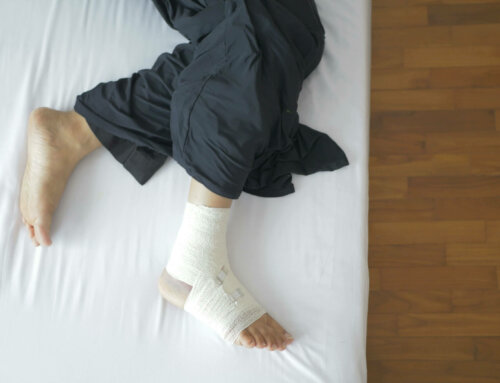Diabetes is linked with various complications, including nighttime leg cramps. These cramps can last for a few seconds or several minutes and may wake you up from a sound sleep. Discover more about nighttime leg cramps and what you can do about them when you have diabetes.
- Nighttime leg cramps can be painful, making your muscles feel tight or knotted. They tend to occur most often in the calves, but can also happen to your thighs and feet. Your muscles could feel sore long after the cramps are gone. You may also get sensations of tingling and numbness. Usually nighttime leg cramps happen to people 50 and older, but can occur in people of all ages. If you experience leg cramps, you should report the symptoms to your doctor. It could be a sign of nerve damage, referred to as diabetic neuropathy, which is a result of ongoing high blood sugar levels (hyperglycemia) with type 2 diabetes. It is important to catch nerve damage early before it leads to more serious complications.
- There are a few basic ways to help prevent nighttime leg cramps. They can happen when you get dehydrated, so drink six to eight glasses of water daily. Stretch your legs gently before you settle into bed. You might want to do five minutes of low-impact exercise before going to bed. The blankets and sheets should be loose around your legs and feet to avoid binding that may compromise your circulation. Proper foot care also makes a difference. Have your feet measured and wear properly fitted shoes with good support. Choose non-binding socks that breathe, such as diabetic socks.
 While these basic suggestions are helpful, it is important to visit a doctor when you have nighttime leg cramps. Without proper management and treatment, these leg cramps may become debilitating. The doctor may prescribe medication to help you with pain management or recommend OTC medications such as ibuprofen and acetaminophen. Never take any type of pain medications without talking to your doctor first as there could be contraindications with other existing medications.
While these basic suggestions are helpful, it is important to visit a doctor when you have nighttime leg cramps. Without proper management and treatment, these leg cramps may become debilitating. The doctor may prescribe medication to help you with pain management or recommend OTC medications such as ibuprofen and acetaminophen. Never take any type of pain medications without talking to your doctor first as there could be contraindications with other existing medications.- Discuss possible vitamin deficiencies with your doctor. Some diabetes and blood pressure medications can zap vitamins and minerals which can cause cramps in your legs. A B12 deficiency can lead to neurological damage. Vitamin B12 occurs naturally in meat and fish. Dietary supplements that might be recommended by your health care team include vitamins B12 and D as well as alpha-lipoic acid and acetyl-L-carnitine. Talk to your doctor before taking any supplements as some have side effects and others could have contraindications. For example, acetyl-L-carnitine can interact poorly with blood thinning medications. While supplements do not cure leg cramps, they can be helpful if your doctor finds any deficiencies. Eat a well-balanced diet that includes lean meat and fish, low-fat dairy, whole grains and fruits and vegetables. Exercise for thirty minutes at least five times a week.
- If nighttime leg cramps lead to daytime discomfort, your doctor might recommend physical therapy or acupuncture to give you relief. Short walks and a lukewarm bath are home remedies that can help reduce the pain. Ongoing cramps or shooting pains could be a sign of diabetic neuropathy or peripheral arterial disease (PAD). Monitor your nighttime leg cramps and share the results with your doctor to avoid developing more serious health problems.
Nighttime leg cramps with diabetes are painful and can interrupt your sleep. It is important to discuss leg cramps with your doctor as they could be a sign of other health problems. With proper treatment and management, you can reduce or eliminate the symptoms associated with nighttime leg cramps.






Leave A Comment